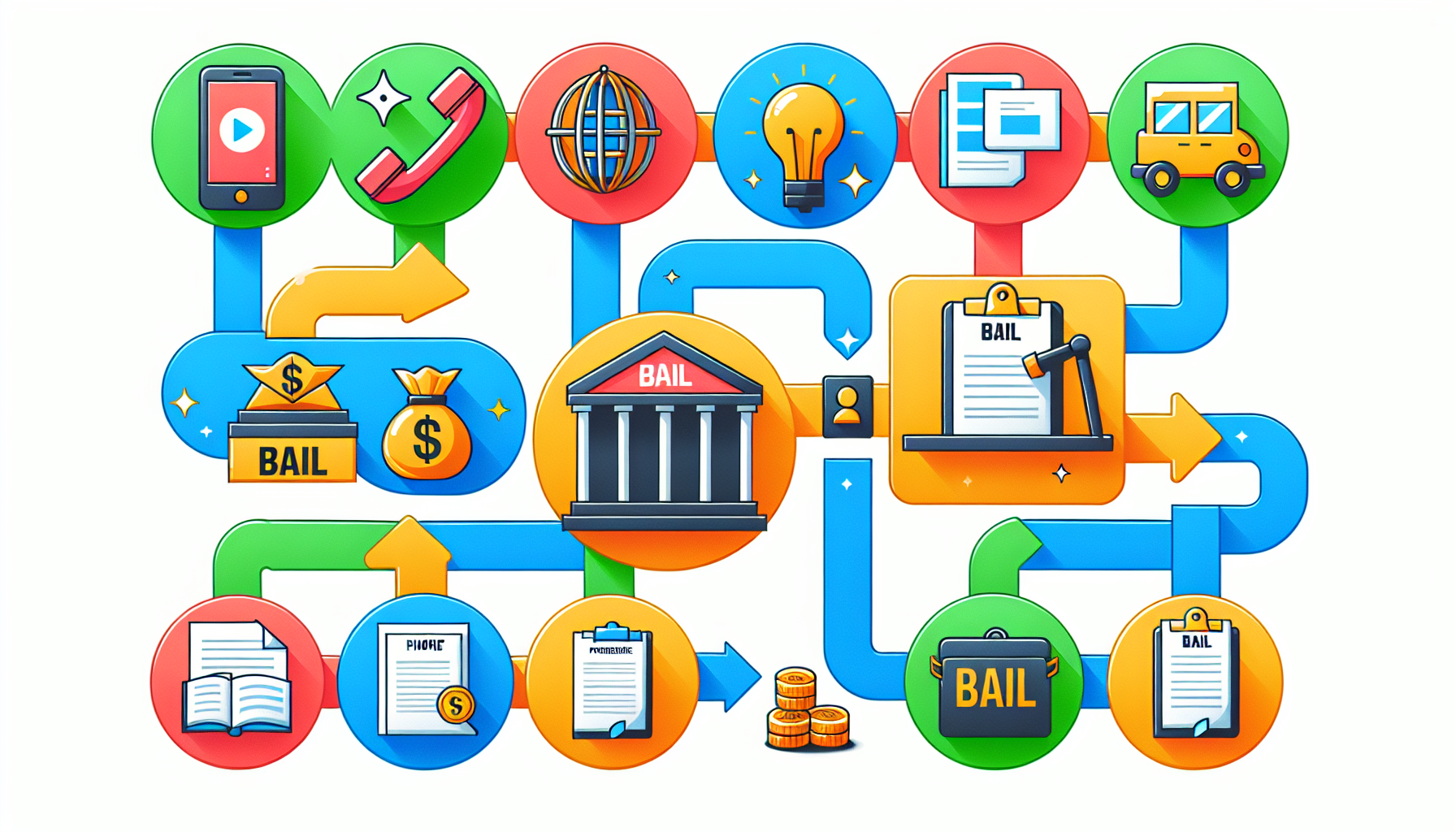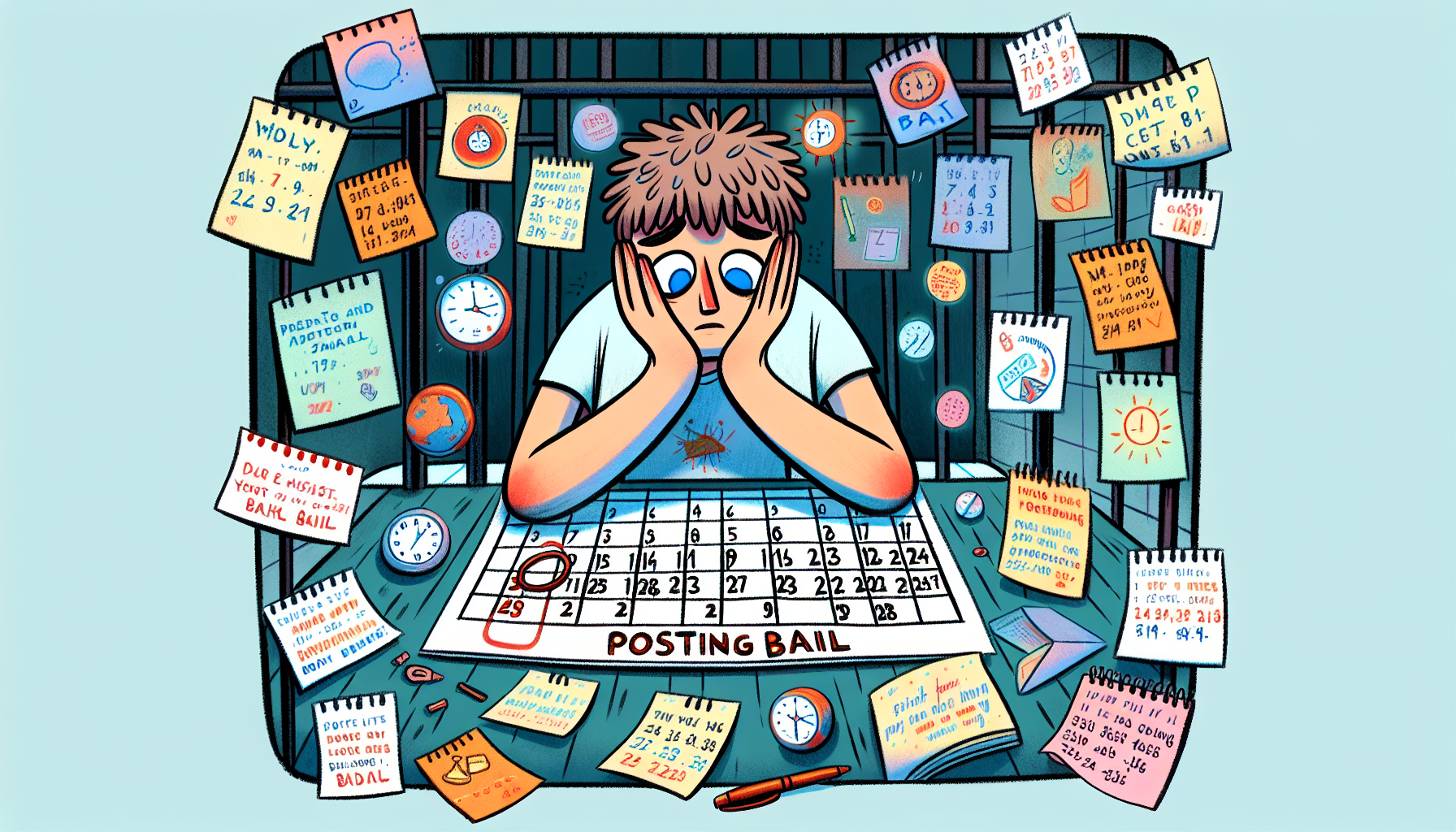Need to get out of jail before a trial? Understanding how does bail bond work can help. A bail bond is a financial guarantee that gets someone released from jail. You pay a bail bond company a small fee, and they cover the full bail amount set by the court. This ensures you or your loved one can await trial at home.
Key Takeaways
- A bail bond is a financial agreement that allows defendants to be released from jail while awaiting trial, usually requiring a non-refundable fee and collateral.
- Bail amounts are set by judges based on factors such as the severity of the crime, the defendant’s criminal history, and risk of flight, with serious offenses typically leading to higher bail.
- Failing to appear in court can result in severe consequences, including the forfeiture of bail, arrest warrants, and financial loss from collateral provided to bail bondsmen.
What is a Bail Bond?

A bail bond is an agreement that allows a defendant to be released from jail, backed by a financial guarantee to ensure their appearance in court. This system helps individuals avoid imprisonment while awaiting trial, supporting the legal principle of innocence until proven guilty.
The process involves a non-refundable fee, usually about 10% of the total bail amount, paid to the bail bond company. These companies also often require collateral, such as property or cash, to secure the bond. This financial arrangement is necessary because most defendants cannot afford to post bail independently.
After an arrest, the accused is given a hearing date, and a bail amount is set based on the severity of the crime. Bail is typically available for non-capital crimes, with judges considering factors such as flight risk and danger to the community. Those unable to afford bail may seek assistance from bail bond services or remain in jail until their trial.
The Role of a Bail Bondsman
A bail bondsman acts as a guarantor, providing the necessary funds to secure a defendant’s release from custody. The primary role of licensed bail bondsmen is to navigate the bail process and post bail on behalf of the accused. They assume the responsibility for ensuring the defendant’s appearance at every scheduled court date.
Engaging a bail bondsman requires a fee and often collateral like property or cash. Once bail is set, the bondsman pays the total bail amount, facilitating the defendant’s release and ensuring they appear in court as required.
If a defendant fails to appear in court, the bail bondsman retains the fee but risks losing the bail amount unless the defendant is found. In such cases, the bondsman can revoke their service and forfeit the collateral. Thus, those who hire a bail bondsman must ensure the defendant complies with all court proceedings.
Types of Bail Bonds
There are different types of bail bonds, each serving different needs and circumstances. Cash bail involves the defendant paying the full bail amount in cash, which is refunded if they attend all court hearings. Surety bonds are the most common type, where the defendant pays a fee of around 10% of the total bail amount to a bail bonds company.
Property bonds use real estate as collateral, requiring full rights to the property without partial claims. Another type is recognizance release, which allows defendants to be released without any payment, based on a promise to appear in court.
Federal bail bonds cater to federal offenses and are generally more expensive and complex. Immigration bail bonds are for non-U.S. citizens and entail strict requirements. Lastly, citation release occurs when a defendant receives a citation for minor offenses and is not taken into custody.
How Bail Amounts are Set
Judges typically set bail during the defendant’s first court appearance following an arrest, which may include a bail hearing or arraignment. Several factors influence the bail amount, including the defendant’s employment status, criminal history, and ties to the community. Felony offenses usually result in higher bail amounts compared to misdemeanors, potentially being 5 to 10 times more.
In some jurisdictions, judges have the discretion to deny bail for serious offenses or if the defendant poses a significant flight risk. This consideration ensures that the bail system balances the need for public safety with the defendant’s right to freedom while awaiting trial.
The Bail Bond Process

The bail bond process can be intricate but generally follows a clear sequence. It starts with contacting a bail bond agent after an arrest, verifying the warrant, completing necessary paperwork, and posting the bond.
This process can take from half an hour to a few hours, leading to the defendant’s release soon after bail is set.
Contacting a Bail Bond Agent
The first step after an arrest is to contact a bail bond agent. Providing the arrest report number is crucial for the bail bond agent to proceed with the process efficiently. At this stage, you can choose to post bail either with cash or through a bail bond.
Discussing payment options and understanding the costs involved is essential to ensure that you can afford the bail bond services. This initial contact sets the stage for the subsequent steps in the bail process.
Completing the Paperwork
Completing the necessary paperwork for a bail bond is a relatively quick process, typically taking about 45 minutes. The paperwork includes a contract detailing the responsibilities of the indemnitor, an agreement on collateral, and identification documents.
This step ensures that both parties understand their obligations and the terms of the bail bond agreement.
Posting Bail and Release
Using a bail bond agency can expedite the release process, often resulting in quicker discharge than paying cash bail. The bail bond agent usually meets the indemnitor at the jail to finalize the bail posting, ensuring a smooth transition from custody to release. Bail bond agencies can provide essential support during this process.
For instance, a $5,000 bail typically involves a $500 fee paid to a bail bondsman. The agent’s role is crucial in ensuring that the defendant is released promptly and that all legal requirements are met.
Responsibilities After Posting Bail

After posting bail, the person who signs for the bail bond (the indemnitor) is responsible for ensuring the defendant attends all court dates. If the defendant misses a court date, the indemnitor may face additional charges if a recovery agent is needed to locate the defendant.
Defendants must adhere to the conditions set in their bail agreement, which may include regular check-ins with the bail agent or following a curfew. Permission from both the court and the bail bondsman is required for the defendant to leave the state.
The bail premium paid is non-refundable, regardless of the case outcome. This financial commitment underscores the importance of complying with all bail conditions and court requirements.
Consequences of Failing to Appear in Court
Failing to appear in court can lead to severe legal repercussions, including the issuance of arrest warrants and bail revocation. If the defendant paid cash bail, the bail money will be forfeited, and the court may issue an arrest warrant.
When a defendant skips court after using a bail bond agent, they become liable for the remaining amount owed to the bondsman, resulting in significant financial loss. Additionally, any collateral posted to secure the bail is at risk of forfeiture.
Defendants released on their own recognizance may face fines or additional charges that could lead to imprisonment for failing to appear. These consequences underscore the necessity of adhering to all court dates and legal obligations.
Choosing a Bail Bond Company
Choosing the right bail bond company is key for a smooth bail process. Make sure the bail bondsman holds a valid license, as this ensures legitimacy and varies by state. The bail bond industry is subject to varying regulations, with some states banning commercial bail bonding altogether.
Seek transparency in fees and collateral requirements. Reputable bondsmen provide clear information about charges without hidden costs. Discussing these aspects upfront ensures that the bail bond services fit your financial situation.
Evaluate the bondsman’s reputation by checking reviews and testimonials from past clients. Personal recommendations from friends, family, or legal experts can also provide valuable insights into a bondsman’s reliability.
Summary
In summary, understanding how bail bonds work is essential for navigating the legal system effectively. This guide has covered the basics of bail bonds, the role of the bail bondsman, different types of bail bonds, how bail amounts are set, and the responsibilities after posting bail. By choosing a reputable bail bond company and adhering to all legal obligations, defendants can ensure a smoother process while awaiting trial.
Frequently Asked Questions
What is a bail bond, and why is it important?
A bail bond is a financial guarantee that allows a defendant to be released from jail while awaiting trial, ensuring their appearance in court. Its importance lies in preserving the principle of innocence until proven guilty, enabling individuals to remain free during legal proceedings.
What does a bail bondsman do?
A bail bondsman provides the funds required for a defendant’s release from custody and guarantees their appearance at all scheduled court dates. This service plays a crucial role in the judicial process.
What are the different types of bail bonds?
The primary types of bail bonds include cash bail, surety bonds, property bonds, recognizance release, federal bail bonds, immigration bail bonds, and citation release. Understanding these options can help you better navigate the legal process.
How are bail amounts set?
Bail amounts are determined by judges at the defendant’s initial court appearance, taking into account factors such as the seriousness of the offense, the defendant’s employment status, criminal history, and community ties. This ensures that the bail is appropriate to the individual circumstances of the case.
What happens if a defendant fails to appear in court?
If a defendant fails to appear in court, it can lead to serious legal consequences such as the issuance of arrest warrants, revocation of bail, forfeiture of bail money, and possible imprisonment. It is crucial to attend all court dates to avoid these repercussions.





